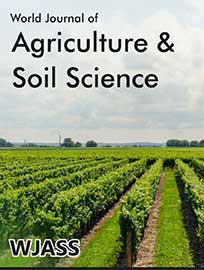 Research Article
Research Article
Sewage Water Effects on Okra (Abelmoschus esculentus (L) Moench) Growth Affected by Organic Matter, and Avm of Pseudomonas fluorescens
Abdul Khalil Gardezi*1, Sergio Roberto Marquez Berber2, Guillermo Carrillo Castañeda1, Hector Flores- Magdaleno1, Gabriel Haro Aguilar1, Eduardo Valdes Velarde2, Miguel Jorge Escalona Maurice1 and Mario Ulises Larque-Saavedra3
1Postgraduate College, Mexico
2Chapingo Autonomous University, Mexico
1Metropolitan Autonomous University, Mexico
Abdul Khalil Gardezi, Postgraduate College, Mexico.
Received Date: February 20, 2019; Published Date: March 26, 2019
Abstract
Okra (Abelmoschus esculentus) is a tropical crop, member of the Malvaceae family. Its fruits are grown and widely used in many countries of Asia and Africa. India is the main producer. It is cultivated in Mexico in small plots with scarce know-how. A sustainable and low-cost technology is needed to increase the profits of the farmers. Pseudomonas fluorescens have been used to increase germination and for biological control of pathogenic fungus. The study was done under greenhouse conditions. Two soils were used. One came from a parcel irrigated with sewage water and the other one was irrigated with clean water from a well. Half of the treatments were inoculated with Pseudomonas fluorescens. Four doses of vermicompost were applied as a source of organic matter. There were significant differences (p≤0.05) in most variables recorded due to the treatments. The soil irrigated with contaminated water only affected root length and fruit number. The plants inoculated with Pseudomonas fluorescens had better shoot and root growth, and fruit number, but it had no effect on fruit weight (p≤0.05). Vermicompost, as source of organic matter, also had a positive effect on Okra growth. Fruit number, and their dry weight augmented with the application of the lowest quantity of organic matter used (25t ha-1). Irrigation with sewage water, inoculation with Pseudomonas fluorescens, and lower quantities of vermicompost can be used to increase the yields of Okra. The use of Pseudomonas fluorescens can help to overcome the negative effects of contaminated waters, and other environmental and biological stresses. Recommendations are made to validate this result under field conditions.
Keywords: Contaminated soils; Bacteria; Vermicompost; Okra yield; Germination test
-
Abdul Khalil Gardezi, Sergio Roberto Marquez Berber, Guillermo Carrillo Castañeda, Hector Flores-Magdaleno, Gabriel Haro Aguilar, et al. Sewage Water Effects on Okra (Abelmoschus esculentus (L) Moench) Growth Affected by Organic Matter, and Avm of Pseudomonas fluorescens. World J Agri & Soil Sci. 1(5): 2019. WJASS.MS.ID.000524.
-

This work is licensed under a Creative Commons Attribution-NonCommercial 4.0 International License.






